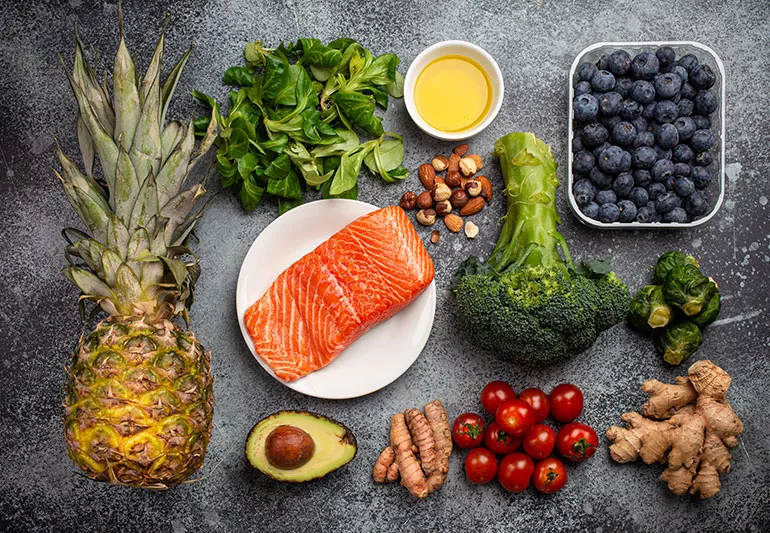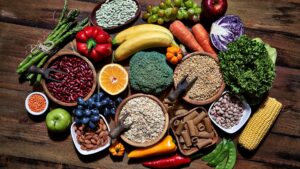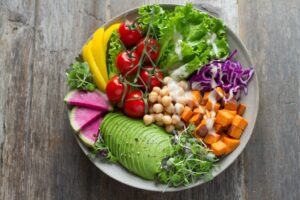Inflammation is an adaptive response to injury or infection, but chronic inflammation can pose health issues. An anti-inflammatory diet may help decrease symptoms associated with inflammation. Eat foods high in anti-inflammatory nutrients, such as berries, leafy greens, nuts and olive oil, to combat inflammation in your body. Stay away from processed food products and sugary beverages.
1. Eat a Wide Variety of Fruits and Vegetables
Inflammation is a natural body response to injury or infection; however, when chronic inflammation arises, it can pose serious health concerns. Adopting healthy habits like eating well and leading an active lifestyle can help alleviate inflammation.
Swap processed foods for nutritious, whole food choices like fresh fruits and vegetables, whole grains, fish and beans. Aim for variety when selecting your food to ensure that all anti-inflammatory nutrients your body requires, such as antioxidants like lycopene and beta-carotene, are being consumed, as well as omega-3 fats, fibre, vitamins and minerals. Start adding berries to your morning cereal and kale to lunch salads, or making vegetable-centric dinners such as ratatouille. Also drink plenty of water and herbal teas that contain anti-inflammatory compounds.
2. Eat Lean Proteins
An anti-inflammatory diet requires meals rich in lean proteins like fish and chicken; whole foods with ample nutrition-rich fruits and vegetables; and healthy fats like olive oil and other healthy sources while minimising or eliminating processed carbs such as white bread.
Be sure to include leafy greens, cruciferous vegetables, fish, nuts (such as walnuts and almonds), berries and low-fat dairy in your diet, as these foods have anti-inflammatory effects. Also avoid secondhand smoke and alcohol, which both increase inflammation levels.
3. Eat Healthy Fats
Consume a range of healthy fats, such as omega-3 fatty acids found in flaxseed, walnuts and salmon, as part of your diet, while also limiting unhealthy ones, such as trans fats found in processed food that increase inflammation.
Make an effort to source most of your fats from plant sources such as olive, peanut and canola oils; avocados; nuts and seeds (particularly sunflower, safflower or sesame seeds); low-fat dairy; as well as some amount of red meat or processed lunch meats that have been linked with increased inflammation.
4. Eat Whole Grains
If you want to reduce inflammation naturally, it’s essential that you steer clear of foods that provide few essential nutrients or are highly processed or fried – such as chips, crackers, canned soups, baked goods, microwave dinners and sugary drinks like soda. Alcohol disrupts your gut microbiome and contributes to inflammation. Consume more whole grains instead of refined ones and opt for unsaturated fats such as avocado oil or olive oil as the best sources of nutrition.
According to a 2021 study published in “Molecules”, foods high in anthocyanins – the pigments responsible for giving red, blue, and purple fruits and vegetables their colour – may help alleviate inflammation. Try blackberries, purple cauliflower, kale, tomato juice or spinach as possible sources.
5. Eat Beans
Beans provide both carbs and protein, making them a key anti-inflammatory food source. Beans contain fibre, which is broken down by good gut bacteria into short-chain fatty acids which suppress inflammation while improving immunity, according to an earlier study published in the Nutrients journal.
Other foods to add to an anti-inflammatory diet include avocados, olive oil and spices such as turmeric, ginger and rosemary. Furthermore, cold-water fish, tofu, walnuts and flax seeds contain many anti-inflammatory nutrients and antioxidants, which make these great anti-inflammatory options.
Step by step, eliminate inflammatory foods from your diet and swap them out with more nutritious and whole-food options. Steer clear of deep-fried and processed options; choose grilled fish or low-fat meat over barbecued choices that could produce cancer-causing compounds.
6. Eat Cherries
Inflammation is your body’s natural response to illness or injury, yet overexposure to inflammation can lead to chronic health conditions. Consuming healthy foods and supplements and engaging in lifestyle habits that reduce inflammation are effective tools.
Start by including more anti-inflammatory foods in your diet. Aim for a variety of colourful fruits and veggies, whole grains, lean proteins and beans in your daily meals – especially cherries from PCC! They contain anthocyanins known to significantly reduce inflammation; additionally, they contain potassium for various bodily processes.
7. Add Hot Sauce
Inflammation is your body’s natural defence mechanism and part of the healing process, yet it can pose serious health issues like heart disease and cancer. Altering your diet is one powerful way to lower inflammation.
Begin by cutting back on foods that cause inflammation, such as sugary desserts and processed snacks. Swap these out for foods rich in antioxidants like dark leafy vegetables, berries and beans; fish as a source of omega-3 fatty acids can also help soothe inflammation throughout your body, while spices or herbs such as hot sauce can add an extra kick!
8. Eat Citrus
Oranges, lemons and other citrus fruits contain vitamin C, which can help lower inflammation. Hesperidin, another nutrient found in these fruits, may also protect cells and support cancer-fighting pathways, and studies show that people who consume 100g a day (or more) of citrus have 13% lower risks of gastric cancer.
An anti-inflammatory diet combined with exercise and stress management techniques can make an important contribution to overall health. Avoiding red meat, refined carbohydrates and fried foods that promote inflammation while adding more antioxidant-rich foods and omega-3 fatty acids to the diet may make a difference in outcomes.
9. Drink Green Tea
Inflammation is a natural reaction designed to defend the body against injuries and illness; however, excessive inflammation can lead to chronic inflammatory diseases, which are the leading causes of mortality worldwide.
An anti-inflammatory diet emphasises eating whole foods rich in omega-3 fatty acids, polyphenols and antioxidants, such as leafy greens, cruciferous vegetables (such as cabbage and cauliflower), fruits, berries, olive oil, garlic, ginger and turmeric, as well as black tea or caffeine-free herbal tea. Fried, processed and red meats along with sugary drinks or added oils and fats should also be limited, while moderate alcohol use may help decrease inflammation. Too much can actually worsen it!




